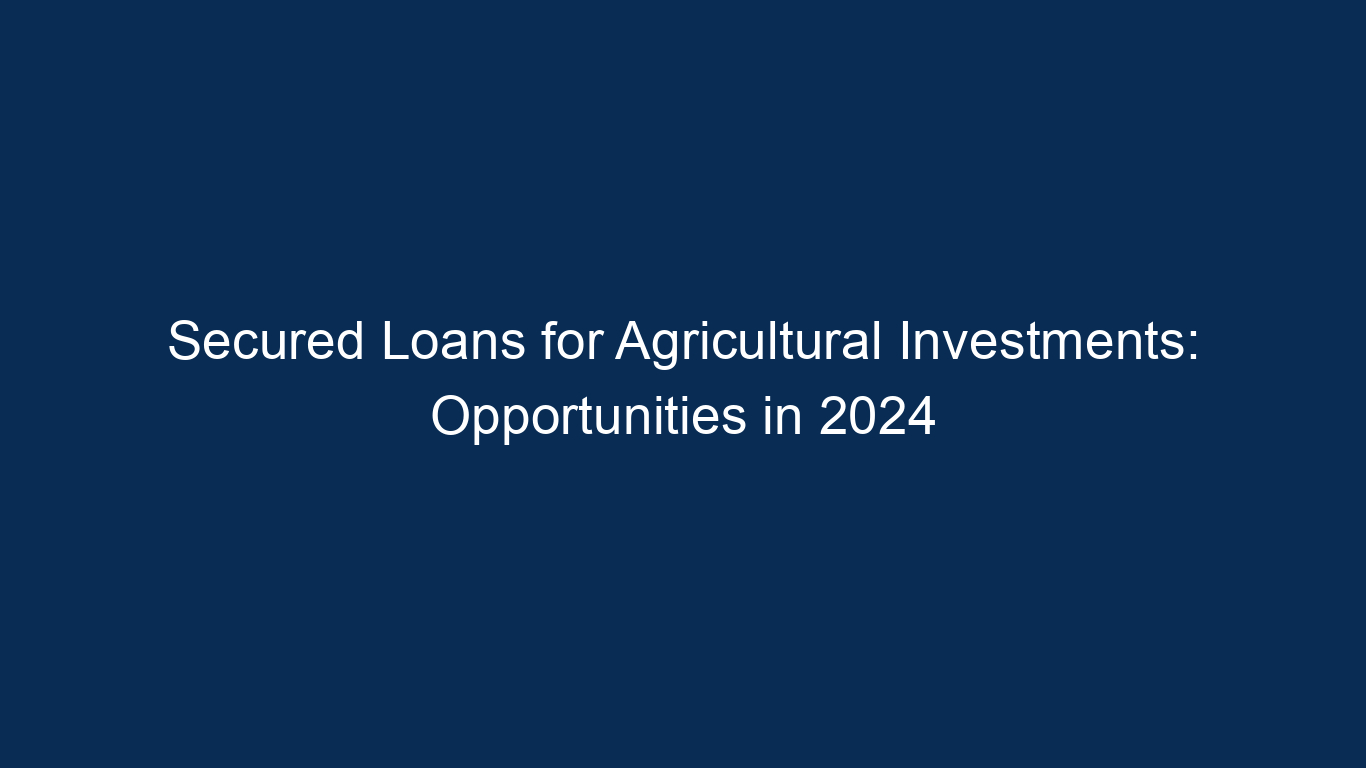In recent years, the agricultural sector has witnessed a significant shift towards sustainable practices and innovative technologies. As a result, there has been a growing demand for investments in agriculture, ranging from small-scale farming operations to large-scale agribusinesses. However, accessing the necessary funds to finance these investments can be a major challenge for many farmers and agribusiness owners.
Fortunately, secured loans have emerged as a viable financial solution for agricultural investments. These loans provide borrowers with the opportunity to secure funds by using their agricultural assets, such as land, crops, or livestock, as collateral. As a result, lenders are more willing to extend credit to farmers and agribusiness owners, as they can recover their investment in case of default.
Looking ahead to 2024, the opportunities for secured loans in agricultural investments are expected to grow significantly. The global population is projected to reach 8.5 billion by 2030, leading to an increased demand for food and agricultural products. This rising demand, coupled with the need for sustainable farming practices, presents a lucrative market for agricultural investments.
Furthermore, advancements in technology and agricultural practices are making the sector more attractive to investors. From precision farming techniques to vertical farming systems, there are numerous opportunities for innovation and profitability in agriculture. Secured loans can play a crucial role in financing these investments, enabling farmers and agribusiness owners to access the necessary funds to grow their operations.
This article will explore the various aspects of secured loans for agricultural investments, including the benefits, requirements, and potential risks. By understanding this financial tool, farmers and agribusiness owners can make informed decisions and seize the opportunities that lie ahead in the agricultural sector in 2024.
Table of Contents
- “Unlocking Agricultural Potential: How Secured Loans can Drive Growth in the Agricultural Sector by 2024”
- “Secured Loans for Agricultural Investments: Exploring the Lucrative Opportunities in 2024”
- “Investing in Agriculture: Why Secured Loans are the Key to Success in 2024”
- “Securing your Agricultural Investments: The Future of Farming with Secured Loans in 2024”
“Unlocking Agricultural Potential: How Secured Loans can Drive Growth in the Agricultural Sector by 2024”
Unlocking Agricultural Potential: How Secured Loans can Drive Growth in the Agricultural Sector by 2024
Introduction:
The agricultural sector plays a vital role in the global economy, providing food, employment, and raw materials for various industries. However, this sector often faces challenges such as limited access to finance, which hinders its growth and productivity. In this article, we will explore how secured loans can be a powerful tool in unlocking the agricultural potential and driving growth in this sector by
-
Secured Loans and their Significance:
Secured loans are financial instruments that require borrowers to provide collateral, typically an asset of value, to secure the loan. These loans offer several benefits, including lower interest rates, longer repayment periods, and higher loan amounts. By offering lenders a level of security, secured loans mitigate the risk associated with lending to the agricultural sector, making it an attractive option for both lenders and borrowers.
Driving Growth in the Agricultural Sector:
- Increased Investment in Infrastructure:
Secured loans can enable agricultural businesses to invest in infrastructure development, such as irrigation systems, storage facilities, and machinery. This investment enhances productivity, reduces post-harvest losses, and improves overall efficiency. By facilitating infrastructure development, secured loans can drive growth in the agricultural sector.
- Adoption of Technological Innovations:
Secured loans provide farmers with the necessary capital to invest in modern agricultural technologies, such as precision farming, drones, and automated machinery. These innovations improve productivity, reduce labor costs, and enhance the quality of agricultural produce. By enabling the adoption of technological advancements, secured loans can significantly contribute to the growth of the agricultural sector.
- Expansion of Agricultural Operations:
Secured loans can support the expansion of agricultural operations by financing land acquisition, farm diversification, and the establishment of new production facilities. This expansion allows farmers to increase their output, tap into new markets, and diversify their revenue streams. By facilitating the expansion of agricultural operations, secured loans can drive growth in the sector.
- Risk Mitigation:
The agricultural sector is exposed to various risks, including weather fluctuations, pests, and market volatility. Secured loans can help farmers manage these risks by providing them with the financial means to invest in risk mitigation strategies. For instance, farmers can use secured loans to purchase insurance coverage, implement sustainable farming practices, and diversify their crops. By mitigating risks, secured loans contribute to the stability and growth of the agricultural sector.
Conclusion:
Secured loans have the potential to unlock agricultural growth and drive productivity in the sector by
- By providing farmers with access to finance, secured loans enable investments in infrastructure, technological innovations, expansion of operations, and risk mitigation strategies. It is crucial for policymakers, financial institutions, and agricultural stakeholders to recognize the significance of secured loans and take proactive measures to promote their availability and accessibility. With the right support, the agricultural sector can realize its full potential and contribute to global food security, economic growth, and sustainable development.
“Secured Loans for Agricultural Investments: Exploring the Lucrative Opportunities in 2024”
Secured Loans for Agricultural Investments: Exploring the Lucrative Opportunities in 2024
Introduction:
Agriculture has always been a vital sector of the economy, providing food, employment, and income opportunities. As the world’s population continues to grow, the demand for agricultural products is expected to rise significantly in the coming years. To meet this demand and capitalize on the lucrative opportunities, agricultural investments are becoming increasingly popular. However, these investments often require substantial financial resources, which can be a barrier for many potential investors. This is where secured loans for agricultural investments come into play, providing a viable financing option. In this article, we will explore the potential benefits and opportunities secured loans can offer to agricultural investors in
-
Benefits of Secured Loans for Agricultural Investments:
Secured loans provide a range of benefits for agricultural investors. Firstly, these loans are often easier to obtain compared to unsecured loans. Lenders are more willing to provide funds when they have collateral to secure the loan against, such as land, equipment, or crops. This reduced risk for lenders increases the chances of approval for borrowers.Secondly, secured loans generally offer lower interest rates compared to unsecured loans. Lenders have more confidence in secured loans due to the collateral, resulting in reduced interest rates for borrowers. This can significantly decrease the overall cost of borrowing and improve the profitability of agricultural investments.
Furthermore, secured loans provide flexibility in terms of repayment periods. Agricultural investments often require a longer time frame to generate returns. Secured loans can offer repayment schedules that align with the investment’s cash flow, allowing borrowers to comfortably repay the loan over an extended period.
Lucrative Opportunities in Agricultural Investments:
Agricultural investments present numerous lucrative opportunities in - The increasing global population, coupled with changing dietary preferences, is driving the demand for diverse agricultural products. This demand extends beyond traditional crops to include specialized products like organic produce, niche livestock, and sustainable farming practices. Investors who can tap into these emerging trends can capitalize on the growing market and generate substantial returns.
Additionally, advancements in technology are revolutionizing the agriculture sector. Precision farming techniques, agricultural drones, and smart irrigation systems are enhancing productivity and efficiency. Agricultural investors who embrace these technological innovations can optimize their operations, reduce costs, and improve profitability.
Furthermore, sustainable and environmentally friendly practices are gaining momentum in the agricultural industry. Investors who prioritize sustainable farming methods and environmentally conscious initiatives can tap into the growing consumer demand for responsibly produced agricultural products. This not only contributes to a positive environmental impact but also enhances the marketability and profitability of agricultural investments.
Conclusion:
Secured loans for agricultural investments offer a viable financing option for investors looking to capitalize on the lucrative opportunities in the agricultural sector in - These loans provide benefits such as easier access to funds, lower interest rates, and flexible repayment terms. With the increasing global population, changing dietary preferences, technological advancements, and growing emphasis on sustainability, the agricultural sector presents a wealth of opportunities for investors. By leveraging secured loans and tapping into emerging trends, agricultural investors can maximize their returns and contribute to the growth and development of this crucial sector.
“Investing in Agriculture: Why Secured Loans are the Key to Success in 2024”
Investing in Agriculture: Why Secured Loans are the Key to Success in 2024
Introduction:
Agriculture has always been a vital sector for economic growth and stability. As we look ahead to the year 2024, it becomes increasingly clear that investing in agriculture will play a crucial role in ensuring food security and sustainability. However, investing in this sector comes with its own set of challenges and risks. To mitigate these risks and maximize returns, secured loans have emerged as a key financing tool for agricultural investments. In this article, we will explore the reasons why secured loans are the key to success in agriculture in
-
I. Importance of Agriculture in 2024:
In 2024, the global population is projected to reach over 8 billion people, placing immense pressure on agricultural production. With the growing demand for food, it is imperative to invest in modern farming techniques, infrastructure, and technology to meet the needs of a rapidly expanding population. Agriculture, therefore, presents a significant investment opportunity for those looking to make a positive impact on food security and contribute to sustainable development.
II. Challenges in Agricultural Investments:
While investing in agriculture can be rewarding, there are inherent risks and challenges associated with this sector. Some of the key challenges include weather-related uncertainties, price volatility, pests and diseases, and the need for substantial capital investments. These challenges often deter potential investors from entering the agricultural sector, making it essential to find innovative financing solutions.
III. Secured Loans as a Financing Tool:
Secured loans have emerged as a viable financing option for agricultural investments due to their ability to mitigate risks and provide security for lenders. These loans are backed by collateral, which could be land, equipment, or other tangible assets, ensuring that the lender has a claim on the collateral in case of default. The presence of collateral reduces the lender’s risk, making it easier to secure financing for agricultural projects.
IV. Benefits of Secured Loans in Agriculture:
- Lower Interest Rates: Secured loans generally come with lower interest rates compared to unsecured loans. This is because lenders perceive secured loans as less risky, given the presence of collateral. Lower interest rates translate into reduced borrowing costs for agricultural investors, making secured loans an attractive option.
- Access to Capital: Secured loans provide farmers and agricultural businesses with access to much-needed capital. This capital can be used to invest in modern farming equipment, improve infrastructure, or expand agricultural operations. By providing access to capital, secured loans enable farmers to enhance productivity and profitability.
- Long-term Repayment Options: Agricultural investments often require a longer time horizon for returns. Secured loans offer flexible repayment options, including longer repayment periods, allowing borrowers to align their loan repayments with their farming cycles. This flexibility is crucial for agricultural investments that may take years to generate significant returns.
- Risk Mitigation: The presence of collateral in secured loans provides lenders with a safety net in case of default. This reduces the risk for lenders, making agricultural investments more attractive to financial institutions. Additionally, lenders may also offer risk management services and expertise to borrowers, further enhancing the chances of success in agricultural investments.
Conclusion:
As we venture into 2024, investing in agriculture will become increasingly important to meet the demands of a growing population. However, the challenges and risks associated with agricultural investments cannot be ignored. Secured loans provide a reliable and effective financing tool that mitigates risks, offers lower interest rates, and provides access to capital for agricultural investments.
“Securing your Agricultural Investments: The Future of Farming with Secured Loans in 2024”
Securing your Agricultural Investments: The Future of Farming with Secured Loans in 2024
Introduction:
In the fast-paced world of agriculture, securing financial investments has become crucial for farmers to ensure the sustainability and growth of their operations. With the ever-evolving landscape of farming practices and technology, it is vital for farmers to stay ahead of the curve and explore innovative financing options. One such avenue is secured loans, which offer a promising future for farmers in
- In this article, we will discuss the benefits and potential of secured loans in the agricultural industry, highlighting their significance in the coming years.
Benefits of Secured Loans:
Secured loans provide farmers with a reliable and stable source of funding for their agricultural investments. Unlike unsecured loans, secured loans require collateral, such as machinery, livestock, or land, which mitigates the risk for lenders. This collateral serves as a guarantee for repayment, allowing farmers to access larger loan amounts at lower interest rates. By leveraging their assets, farmers can secure substantial funding to invest in modern farming techniques, equipment upgrades, and infrastructure development.
The Future of Secured Loans in Farming:
In 2024, secured loans are poised to revolutionize the farming industry by facilitating its transition towards sustainable and technologically advanced practices. As climate change and environmental concerns continue to shape the agricultural landscape, farmers will increasingly rely on secured loans to implement eco-friendly initiatives. These loans will enable farmers to adopt precision farming techniques, conservation practices, and renewable energy systems, fostering a more sustainable approach to agriculture.
Furthermore, the rapid advancements in agricultural technology require substantial capital investment. Secured loans will play a pivotal role in helping farmers acquire cutting-edge machinery, drones, sensors, and other innovative tools. By integrating these technologies into their operations, farmers can improve efficiency, reduce costs, and optimize crop yields.
The Importance of Formal Writing:
Given the significance of secured loans in the agricultural industry, it is essential to adopt a formal writing tone when discussing this subject matter. The formality of writing ensures that the information provided is credible, accurate, and professional. Moreover, formal writing conveys the seriousness and importance of the topic, instilling confidence in readers and establishing the article as a reliable source of information.
Conclusion:
Secured loans have emerged as a game-changer in the agricultural sector, offering farmers the financial support they need to thrive in an ever-changing industry. By providing collateral-based funding options, secured loans enable farmers to invest in sustainable practices and cutting-edge technology, ensuring a bright future for agriculture. As we look towards 2024, it is evident that secured loans will continue to shape the farming landscape, driving innovation, and securing the long-term success of agricultural investments.
In conclusion, secured loans for agricultural investments present promising opportunities in
- The agricultural sector plays a vital role in the global economy, and there is a growing need for capital to support its growth and development. Secured loans provide a reliable and effective financing solution for agricultural investments, offering lenders a sense of security and borrowers access to the necessary funds. With advancements in technology and changing consumer demands, the agricultural industry is poised for significant expansion, making it an attractive sector for investors. Additionally, the agricultural sector offers a range of investment opportunities, including crop production, livestock farming, and agribusiness, allowing investors to diversify their portfolios. However, it is crucial for both lenders and borrowers to conduct thorough due diligence and risk assessment to ensure the success of these investments. Overall, secured loans for agricultural investments have the potential to generate stable returns and contribute to the sustainable growth of the agricultural sector in the coming years.






